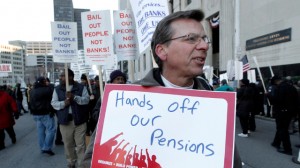
In this Oct. 23, 2013 file photo, Dennis Marton walks with protesters at a rally outside The Theodore Levin United States Courthouse in Detroit. (AP Photo/Paul Sancya, File)
Last fall, journalists David Sirota and Matt Taibbi dug into a well-funded Wall Street campaign to loot public pension funds. A number of states had, or were in the process of turning billions of dollars in public employees’ retirement funds over to various financial firms that in turn skimmed exorbitant fees off the top.
As Taibbi explained to BillMoyers.com last September, the whole campaign is based on the myth that public pension funds around the country are suffering from some sort of naturally occurring funding gap. The reality, he pointed out, was quite different: The public pension “crisis” was created by states refusing to make required payments into their funds, often in violation of state laws, and by investing in garbage securities that Wall Street had paid the ratings agencies to bless with triple-A ratings.
Today, Murtaza Hussain reports for The Intercept that while Wall Street “has been fighting to turn public pensions into private profits for quite some time,” these pension-raiders enjoyed especially good election results earlier this month.
Coverage of the midterm elections has, understandably, focused on the shift in political power from Democrats toward Republicans. But behind the scenes, another major story has been playing out. Wall Street spent upwards of $300M to influence the election results. And a key part of its agenda has been a plan to move more and more of the $3 trillion dollars in unguarded government pension funds into privately managed, high-fee investments — a shift that may well constitute the biggest financial story of our generation that you’ve never heard of.
Illinois, Massachusetts, and Rhode Island all recently elected governors who were previously executives and directors at firms which managed investments on behalf of state pension funds. These firms are now, consequently, in position to obtain even more of these public funds. This alone represents a huge payoff on that $300M investment made by the financial industry, and is likely to result in more pension money going into investments which offer great benefits for Wall Street but do little for the broader economy.
There’s much more on the big banks’ long-running campaign to get their hands on the money public sector workers rely on for their futures. Read the rest at The Intercept.

